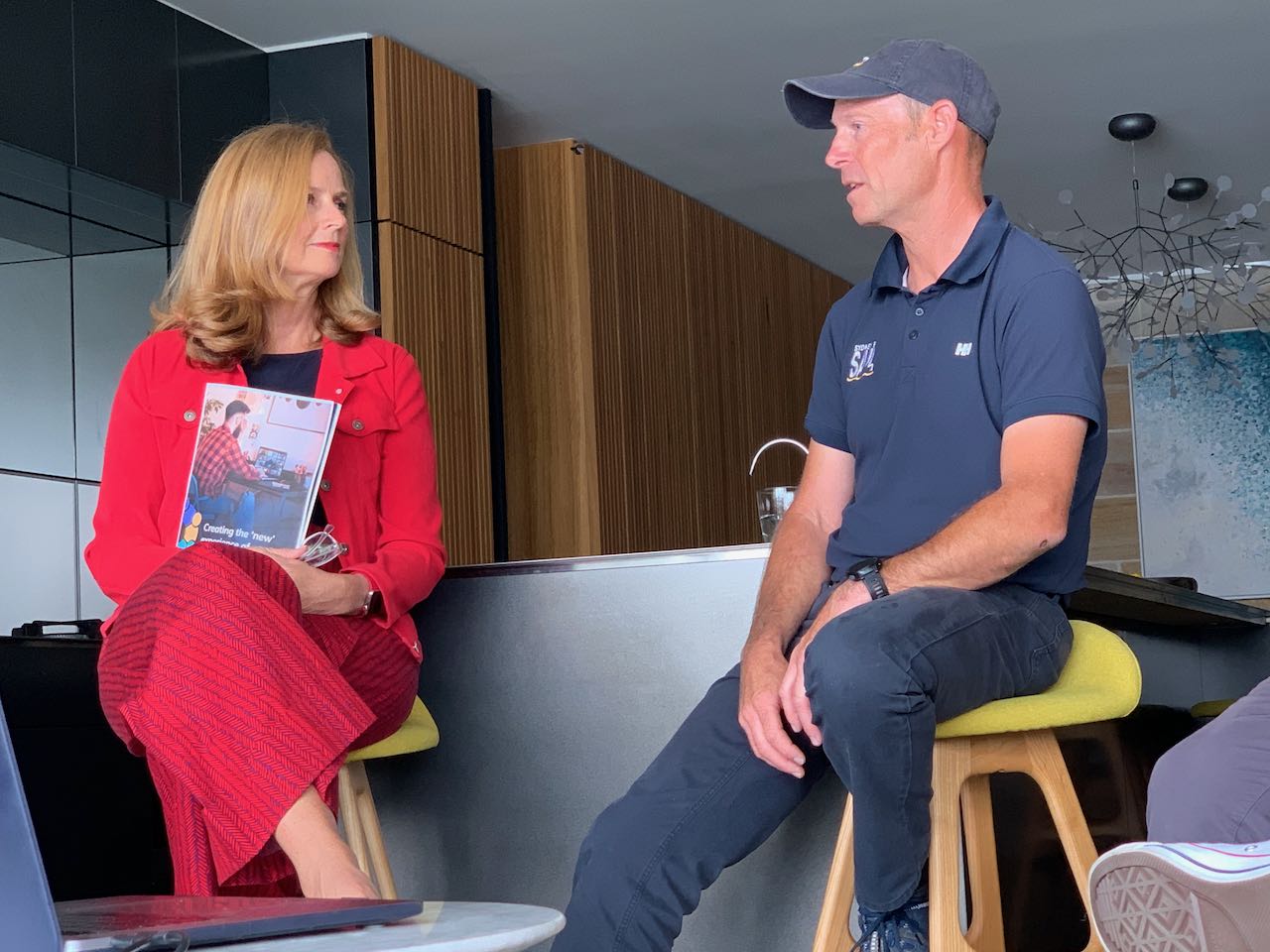Why a 'Business with Purpose' is No Longer a Choice, But a Necessity
I want you to cast your mind back to the traditional image of a successful businessperson. It’s a picture often painted in shades of grey—a relentless focus on the bottom line, on profit margins, on shareholder value. For generations, we were taught that business was a machine for making money. Its purpose was profit. Anything else—any talk of passion, of impact, of a greater "why"—was considered soft, sentimental, and ultimately, a distraction from the real work.
I am here to tell you that this model of business is not just outdated; it is dying. And a new, more vibrant, more resilient, and ultimately more profitable model is rising to take its place.
That model is the business with purpose.
After more than forty years in the commercial world—from the structured corridors of corporate giants to the terrifying, exhilarating free-fall of starting my own ventures—I have learned an unshakeable truth: Purpose is not the opposite of profit. Purpose is the engine of profit. It is the single greatest competitive advantage you can build in the modern economy.
This isn't a theory I read in a textbook. It is a truth I have lived in my bones. It is the very foundation upon which I built RedBalloon and, later, co-founded Big Red Group. It is the quality I looked for most keenly in the eyes of every entrepreneur who walked into the Shark Tank.
But what does it really mean to be a "business with purpose"? It has become a buzzword, often slapped onto a marketing campaign like a fresh coat of paint. But true purpose is not paint. It is the very architecture of your business. It is the load-bearing walls, the foundation, and the North Star in your sky.
So, let's go beyond the buzzwords. This is my definitive guide to understanding, building, and leading a business with purpose—and why it is the only way to build a business that will not just survive, but truly thrive, in the decades to come.

Defining "Business with Purpose" - It's Not What You Think
Before we can build one, we have to be crystal clear on what a purpose-driven business is, and what it is not.
What a Business with Purpose is NOT:
- It is not a charity. A business with purpose must be fiercely commercial. It must be profitable and financially sustainable. A noble mission without a sound business model is a charity with a deadline. Profit is the fuel that allows your purpose to have a lasting impact.
- It is not just a marketing slogan. It is not a clever tagline you invent in a branding workshop. If your "purpose" doesn't influence your hiring decisions, your product development, and how you behave when things get tough, it is not a purpose; it is a lie.
- It is not just for startups or "social enterprises." Any business, in any industry, at any stage, can be a business with purpose. It is a choice of leadership, not a category of company.
What a Business with Purpose IS:
A business with purpose has a clear, compelling answer to the most important question of all: "Why do we exist, beyond making money?"
Your purpose is your "why." It is the reason you get out of bed in the morning. It is the change you want to make in the world. It is the problem you are obsessed with solving.
- For a pharmaceutical company, the purpose is not "to sell pills." It's "to alleviate human suffering."
- For an accounting firm, the purpose is not "to do people's taxes." It's "to provide financial peace of mind so families can thrive."
- For an outdoor gear company, the purpose is not "to sell jackets." It's "to inspire and enable human adventure."
Your purpose is your compass. It is the filter through which you make every single strategic decision. It is the soul of your company.
The RedBalloon Story - A Case Study in Purpose
I can't talk about this topic without talking about my own journey. The story of RedBalloon is, at its heart, a story about the commercial power of purpose.
In 2001, I was a corporate marketer with two young children. I had a great career, but I felt a growing unease. I looked at my own life and the world around me and saw us all drowning in stuff. We were giving gifts out of obligation, adding to the clutter in each other's homes, and missing the opportunity for real connection.
The spark for RedBalloon was not a business plan. It was a personal conviction. It was a belief that experiences are more valuable than possessions. It was the idea that a shared memory—a hot air balloon ride at dawn, a cooking class with a loved one, the thrill of driving a race car—was a far greater gift than another scented candle or a pair of socks.
This became my purpose. It was simple, clear, and deeply felt: To change the nature of gift-giving in Australia from stuff to experiences.
This purpose became my everything.
- It was my fuel through the terrifying early days, when I invested my last $25,000 and the naysayers told me the idea would never work.
- It was my guide for every product decision. If an experience didn't have the potential to create a lasting, positive memory, we wouldn't list it.
- It was my marketing strategy. I didn't just sell vouchers; I sold the story of connection, of adventure, of living life to the fullest. The media was drawn to the human story, not the e-commerce platform.
- It was my recruitment tool. I attracted a team of people who were not just looking for a job, but who were passionate believers in our mission. We weren't just employees; we were "memory-makers."
This purpose-led culture was why RedBalloon was recognised as one of Australia’s Best Places to Work for five consecutive years. It wasn't the office perks; it was the shared sense of meaning in our work.
The financial success of RedBalloon was a direct result of our unwavering commitment to this purpose. The purpose attracted the customers, it inspired the team, and it differentiated us in the market. It was our greatest asset. And as we grew, that purpose evolved. It scaled from RedBalloon to the broader mission of our parent company, Big Red Group, which is to serve an experience every second, somewhere in the world. The "why" remained the same, but the scale of its ambition grew.

The Hard-Nosed Business Case for Purpose - Your Ultimate Competitive Advantage
I want to be very clear. I am not advocating for purpose because it's a "nice" thing to do. I am advocating for it because, in the 21st century, it is the smartest, most pragmatic, and most profitable way to build a business. A clear and authentic purpose is a powerful driver of commercial outcomes.
1. It is a Magnet for Talent:
The war for talent is the single biggest challenge facing business today. And the game has changed. The best and brightest are no longer just looking for a competitive salary. They are looking for meaningful work. They want to contribute to something that matters. A powerful purpose is your ultimate recruitment and retention tool. It allows you to attract A-players who are intrinsically motivated, who care deeply about the quality of their work, and who will stay with you for the mission, not just the money.
2. It Builds a Tribe of Loyal Customers:
In a world of infinite choice, consumers are not just buying what you do; they are buying why you do it. Your purpose is your story, and stories are what create deep emotional connections. A business with a clear purpose doesn't just have customers; it has a tribe. It has advocates and evangelists who feel like they are part of a movement. This creates incredible brand loyalty, reduces price sensitivity, and turns your customers into your most powerful marketing department.
3. It Drives Innovation and Strategic Clarity:
A clear purpose is the ultimate strategic filter. It simplifies decision-making in a complex world. When you are faced with a new opportunity or a difficult choice, you can ask a simple question: "Does this move us closer to achieving our purpose?"
- Should we launch this new product?
- Should we enter this new market?
- Should we partner with this other company?
Your purpose acts as your compass, helping you to say "no" to the hundreds of good ideas so you can focus your limited resources on the few, truly great ideas that are in perfect alignment with your mission. This creates focus, agility, and a culture of relentless innovation towards a clear goal.
4. It Forges Powerful, Authentic Partnerships:
When your purpose is clear, you become a magnet for like-minded people and organizations. Potential partners, suppliers, and collaborators who share your values will be drawn to you. This leads to more authentic, more effective, and more enjoyable business relationships. It shifts your partnerships from being purely transactional to being truly collaborative.
5. It Fuels Founder Resilience:
This is perhaps the most personal, and most important, benefit of all. The entrepreneurial journey is a brutal, relentless rollercoaster. There will be days of crushing self-doubt, of overwhelming stress, and of spectacular failure. On those dark days, your profit and loss statement will not be enough to get you out of bed. Your purpose will. Your unwavering belief in the "why" is the deep well of resilience you will need to draw from to endure the hard yards. It is the fuel that will keep you going when everything else is telling you to quit.
The 'How-To' - A Practical Framework for Building Your Purpose-Driven Business
This all sounds great, but how do you actually do it? How do you move purpose from a lofty idea to a practical, daily reality?
Step 1: Discover and Articulate Your "Why"
You cannot build what you have not defined. You must do the deep work to discover and articulate your purpose. This is not a one-hour marketing exercise. It is a soul-searching process.
- Ask the "5 Whys": Start with what you do, and ask "why?" five times to get to the root emotional core. (e.g., "We sell running shoes." Why? "To help people run." Why? "So they can be healthier." Why? "So they can live longer, more vibrant lives." Why? "So they can have more quality time with their families." Why? "Because we believe connection and wellbeing are the cornerstones of a happy life.")
- Look for the Pain: What is the problem, the injustice, or the frustration in the world that you are most passionate about solving?
- Write it Down: Your purpose statement should be simple, clear, and inspiring. It should be easily understood by your grandmother and your newest employee. The purpose for RedBalloon was simple: "To change the way people experience gifts."
Step 2: Weave Your Purpose into the Fabric of Your Business
Once defined, your purpose must be the golden thread that is woven into every single aspect of your organization.
- Hiring and Onboarding: Hire for mission alignment first. Your onboarding process should be a deep immersion into the company's "why."
- Marketing and Communications: Every piece of marketing, from a social media post to a major ad campaign, should be a reflection of your purpose.
- Product and Service Development: Every new feature or service should be filtered through the question: "Does this help us better fulfill our purpose?"
- Leadership and Recognition: As a leader, you must relentlessly communicate the purpose. And you must publicly celebrate team members who embody it in their daily work.
Step 3: Measure Your Impact
A business with purpose needs to measure more than just its profit. You must identify the key metrics that tell you if you are succeeding in your mission. For RedBalloon, it was not just revenue; it was the number of experiences delivered, the customer satisfaction scores, and our employee engagement rates. Making your impact measurable proves that your purpose is a real, strategic objective, not just a feel-good slogan.
The Future of Business is Purposeful
The world has changed. The old, one-dimensional model of business is no longer sufficient. Your employees are demanding more meaning. Your customers are demanding more authenticity. The planet is demanding more responsibility.
Building a business with purpose is no longer a niche strategy for "social enterprises." It is the new global standard for building a resilient, respected, and highly profitable business in any industry.
Your purpose is your story. It is your strategy. It is your soul. It is the greatest asset you will ever build. It is the legacy you will leave behind long after the spreadsheets have been forgotten.
So, I ask you the same question that every great business must answer: Why do you exist? How have you made the world a slightly better place?
What is the purpose at the heart of your own business or career?
Frequently Asked Questions (FAQs) on Business with Purpose
What does it mean to run a "business with purpose"?
Running a business with purpose means that the company is driven by a core reason for its existence that goes beyond simply making a profit. It is a clear and authentic answer to the question, "Why do we do what we do?" This purpose acts as a guiding principle that informs the company's strategy, culture, and decision-making.
Why is having a clear purpose so important for modern companies?
A clear purpose has become a powerful competitive advantage. It acts as a magnet for attracting and retaining top talent who seek meaningful work, and it builds deep, lasting loyalty with customers who want to support brands that align with their own values. In times of uncertainty, a strong purpose provides the "north star" that keeps the entire organization focused and resilient.
How is a company's purpose different from its mission or vision?
While related, they are distinct. A company's mission typically defines what it does, and its vision describes where it is going. The purpose, however, is the fundamental why behind it all. It is the emotional core and the human impact of the company's work in the world.
How can a leader begin to define their company's purpose?
A leader can begin by facilitating a deep and honest conversation with their team, asking foundational questions such as: "What problem are we truly passionate about solving?", "What unique contribution do we make to our customers and community?", and "What would be lost if our business no longer existed?". The answer often lies at the intersection of what the company is good at and what the world needs.
How does a purpose-driven culture impact employees?
A purpose-driven culture has a profound impact on employee engagement and fulfillment. When people feel that their daily work is connected to a meaningful cause that is larger than themselves, their motivation, morale, and sense of belonging skyrocket. This leads to higher retention rates and a more passionate, innovative workforce.





